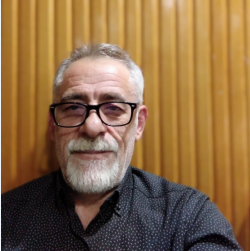
Peygamberimiz Hz. Muhammed Mustafa (s.a.v.) bir gün ashabıyla otururken şöyle dedi:
“İki Müslüman birbirine kılıç çekerse, öldüren de öldürülen de cehenneme gider."
(Ebu Bekre der ki:) ‘Ey Allah’ın Resulü! Kâtili, öldüreni anladık da, ya maktul, ölen niçin cehenneme gider?’ dedim.
“Çünkü, o da -bütün gücüyle- arkadaşını öldürmek için çaba gösteriyordu.” diye buyurdu.” (Buharî, İman, 22; Rikak, 31; Fiten, 10; Müslim; Fiten, 14).
Bugün sosyal hayatın her kademesinde sürekli olarak insanlarla sınanıyoruz.
Herkes kendi durduğu açıdan haklı olduğu iddiasıyla muhatabını suçluyor, onu haksız buluyor hatta hak bende iddiasıyla saldırıyor, zarar veriyor, yaralıyor, öldürüyor.
Oysa bu konuda Kur’an-ı Kerim’de Allah’ın koyduğu ve Resulü’nün hayatında uyguladığı net.
Allah Teala Habil-Kabil kavgasında Habil’in duruşunu ve tavrını onaylıyor ve bize ölçü olarak bildiriyor:
“Eğer beni öldürmek üzere elini bana kaldırırsan, (kendimi savunmaya çalışırım ama) ben seni öldürmek için (asla) elimi sana kaldırmam. Çünkü ben, âlemlerin Rabbi olan Allah'a karşı yanlış yapmaktan korkarım.” Maide, 5/28)
Peygamberimiz (s.a.v.) kavganın başlangıcı münakaşa için müminini yaklaşımını şöyle bildiriyor:
“"Ben, haklıyken bile çekişmeye girmekten kaçınan kimse için cennetin kenarından, şakadan da olsa yalan söylemeye yanaşmayan kimse için cennetin ortasından, huyunu güzelleştiren kimse için de cennetin en yükseğinden bir köşk (verilmesin)e kefilim." (Ebu Davud, Edeb 7; Tirmizî, Birr 158; Nesâî, Cihad 19; İbn Mâce, Mukaddime 7)
“Kişinin amelleri niyetlerine göredir.” (Buhari, 11/359)
O halde günlük hayatın akışında; komşumuzla, trafikte, işyerlerimizde, çarşıda, pazarda, her an ve her yerde Habil tavrı, niyeti, sabrı ve fedakarlığını kuşanalım.
Biz de Müslüman kardeşimize zarar vermeye niyetlenmişsek, -olayın sonucu ne olursa olsun ister vuran olalım ister vurulan, galip ya da mağlup, katil ya da maktul- ikimizin de cehenneme doğru giden bir yola birlikte girdiğimizi unutmayalım.
İmanımız gereği kardeş kılındığımız her Müslüman kardeşimizi içten sevelim, hepsinden ve herkesten önce biz selam verelim, hal hatır soralım, yardımcı olalım ve birlikte cennet yollarına düşelim.
Sevelim, sevilelim, dünya kimseye kalmıyor…
“Kırk hadis” şeklinde meşhur olanlardan konuya daİR birkaçıyla yazımızı tamamlyalım.
“Mümin hem sever, hem de sevilir. Sevmeyen ve sevilmeyende hayır yoktur. İnsanların hayırlısı onlara hayırlı olanıdır.”
“Kızdığında sükûnetini bozmayan kişiye Allah’ın sevgisi vacip olur.”
“Kendisini ilgilendirmeyen şeyleri terk etmek, kişinin Müslümanlığının güzelliğindendir.”
“Merhamet etmeyene merhamet olunmaz.”
The one who kills is ok, but how can the deceased be in hell?
Our Prophet Muhammad Mustafa (pbuh) said one day while sitting with his companions:
“If two Muslims draw swords at each other, both the murderer and the one who is killed will go to hell.”
(Abu Bakr says:) 'O Messenger of Allah! We understood the murderer, the murderer, but I said, 'Why does the deceased go to hell?'
“Because he too was trying—with all his might—to kill his friend.” he commanded.” (Bukhari, Iman, 22; Rikak, 31; Fiten, 10; Muslim; Fiten, 14).
Today, we are constantly being tested by people at all levels of social life.
Everyone accuses his/her interlocutor with the claim that he/she is right from his/her point of view, finds him/her unfair and even attacks, harms, injures, kills with the claim that I have the right.
However, it is clear in the Qur'an that Allah has set it and applied it in the life of His Messenger.
Allah the Exalted approves of Abel's stance and attitude in the fight between Abel and Cain and informs us as a criterion:
“If you raise your hand to me to kill me, (I try to defend myself) I will (never) raise my hand to you to kill you. Because I fear doing wrong against Allah, the Lord of the worlds.” Maida, 5/28
Our Prophet (pbuh) describes his believer's approach to the beginning of the fight as follows:
“I guarantee a mansion from the edge of Paradise for the person who refrains from quarreling even when he is right, in the middle of Paradise for the person who refuses to lie even if he is joking, and a mansion from the highest level of Paradise for the person who improves his temperament.”(Abu Davud,Adab 7;Tirmidhi,Birr 158; Nesai,Jihad 19;İbn Mâce,Mukaddime 7)
“A person's deeds are according to his intentions.” (Bukhari, 11/359)
So in the flow of daily life; Let's put on the attitude, intention, patience and self-sacrifice of Abel with our neighbors, in traffic, in our workplaces, in the market, at any time and everywhere.
If we also intend to harm our Muslim brother, let us not forget that we both embarked on a path leading to Hell together, regardless of the outcome of the incident, whether we were the shooter or the shot, the victor or the vanquished, the murderer or the victim.
Let us sincerely love each and every Muslim brother to whom we have been made brothers by our faith, let us greet each other first and foremost, ask about the situation, help us, and let us fall on the paths of heaven together.
Let's love, let's be loved, the world does not belong to anyone...
Let's finish our article with a few of the famous ones in the form of "forty hadiths" on the subject.
“A believer both loves and is loved. There is no good in those who do not love and are not loved. The best of people is the one that is good to them.”
“The love of Allah becomes obligatory on a person who does not break his peace when he is angry.”
“It is one of the beauty of a person's Islam to abandon things that do not concern him.”
“There is no mercy for those who do not show mercy.”
 Mehmet Karataş
VAY VAY VAY!!!
Mehmet Karataş
VAY VAY VAY!!!
 İmdat Yayla
Teşkilatın İl ve İlçe Başkanlığına Liyakatli insanlar Getirilmeli
İmdat Yayla
Teşkilatın İl ve İlçe Başkanlığına Liyakatli insanlar Getirilmeli
 ŞÜKRÜ PORTAKAL
Neden Kazanamadılar
ŞÜKRÜ PORTAKAL
Neden Kazanamadılar
 Erol Sunat
Yaşadığımız Her Güzel Gün Bayram Olsun
Erol Sunat
Yaşadığımız Her Güzel Gün Bayram Olsun
 Dr. Cemil Paslı
Siyasette Adalet mi Fayda mı?
Dr. Cemil Paslı
Siyasette Adalet mi Fayda mı?
 Muhammed Kemal Erdem
Harunlar Köyü Adını Seyyid Harun Veli’den mi Alıyor?
Muhammed Kemal Erdem
Harunlar Köyü Adını Seyyid Harun Veli’den mi Alıyor?
 Mahmut İşcan (İlçe Milli Eğitim Müdürü)
Güzel Bak Güzel Gör
Mahmut İşcan (İlçe Milli Eğitim Müdürü)
Güzel Bak Güzel Gör
 Ayşe ÜNÜVAR :(Uzm. Psk. Dan. Eğitimci Yazar)
Eskidendi Şivlilik
Ayşe ÜNÜVAR :(Uzm. Psk. Dan. Eğitimci Yazar)
Eskidendi Şivlilik
 Duran Çölcü
Savunma Sanayinde Konya’nın Gücü Giderek Artıyor
Duran Çölcü
Savunma Sanayinde Konya’nın Gücü Giderek Artıyor
 PROF. DR. ŞAHİN AKINCI
Bir Yargı Krizi: Yargıtay’ın Şerafettin Can Atalay Kararı
PROF. DR. ŞAHİN AKINCI
Bir Yargı Krizi: Yargıtay’ın Şerafettin Can Atalay Kararı
